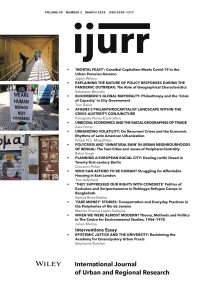This article re-examines the history of the UK Centre for Environmental Studies (CES) between 1966 and 1975. Using archival materials and interviews, the article details the role of the CES in attempts to ‘modernize’ urban and regional research and working relationships between the academy and government. The CES is probably best known, by readers of this journal, as the initial editorial base for the International Journal of Urban and Regional Research (IJURR) and for its role in incubating radical urbanism. However, as we show, these activities sat alongside important early developments in both computational social science and radical experiments in the use of the social sciences in policymaking, in ways that have, hitherto, not been well understood. The article is not intended as an exercise in nostalgia but, rather, one that gestures towards what Mark Fisher termed a ‘hauntological’ form of analysis; to quote Fisher, ‘[w]hen the present has given up on the future’ there is value in listening ‘for the relics of the future in the unactivated potentials of the past’.
Details
Written by:
Julian Molina, Roger Burrows
Digital Object Identifier (DOI)
https://doi.org/10.1111/1468-2427.13298
About DOI

